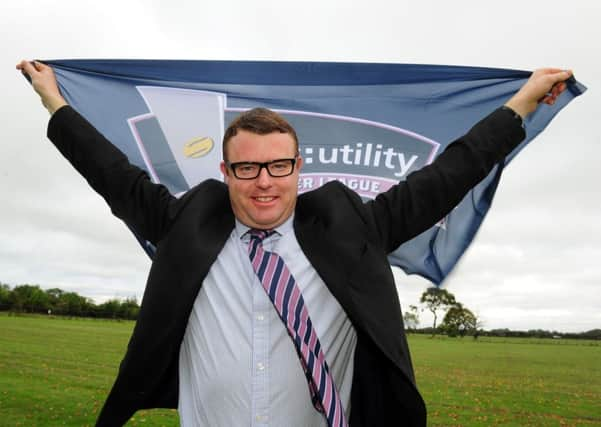Poll: Super League plans London boom


In recent seasons, rugby union have played various club games at Twickenham with Harlequins, particularly, taking one of their Premiership home matches in each of the last six years to HQ during the Christmas period.
They play champions Northampton Saints there on Sunday with Leicester Tigers, London Wasps and Saracens all having acted as previous opponents. A crowd of around 70,000 – compared to an average of 13,000 at their Twickenham Stoop ground – is expected and Super League general manager Blake Solly envisages rugby league adopting something similar in the future.
Advertisement
Hide AdAdvertisement
Hide Ad“I can see that happening,” he told The Yorkshire Post, the Premiership also hosting a season-opening September Twickenham double-header since 2004.
“We don’t have the benefit of Twickenham and the attraction that has for people who like union; it is a huge draw for the average rugby union fan to say ‘I’ve been to a game at Twickenham’.
“I suspect it will be a long time before we’re doing it on the scale that Premier Rugby does. But I am reasonably confident that we’ll have two big Super League sides playing in London in 2016 or, if not, certainly 2017. A Wigan v St Helens or Leeds Rhinos v Hull FC match would be attractive there; I don’t see why in the future we can’t see a game like that which draws huge amounts of people to it as a one-off event.
“A number of our clubs are looking at what they can do to grow their brand. Taking a game to London is a way of doing that.
Advertisement
Hide AdAdvertisement
Hide Ad“Our job at Super League, too, is to start creating sell-out events. Once you start doing that, people want more of them.
“So, when our Grand Final is sold out, and Magic Weekend and the Challenge Cup, too, we can take a Leeds v Hull or Wigan v Saints game to London and be confident we’d get a huge crowd due to that sell-out mentality.”
West Ham’s 54,000 capacity Olympic Stadium, set to be opened in 2016, QPR’s Loftus Road and Fulham’s Craven Cottage are all potential venues, while Wembley, where the RFL stages the Challenge Cup final every year, or Arsenal’s 60,000 capacity Emirates Stadium, are further options.
Solly, who took on the new role in May, has been tasked with raising Super League’s profile, attracting more sponsorship and helping increase crowds.
Advertisement
Hide AdAdvertisement
Hide AdThe Super League Grand Final at Old Trafford has consistently attracted more than 65,000 since 2003 and broken the 70,000 barrier five times in that period.
It has, though, yet to reach the ‘sold-out’ 75,000 capacity, something he has targeted next season.
Similarly, Solly wants to see Wembley, which holds 90,000, full for the Challenge Cup final and, he suggests, enticing new fans in London is the way forward to achieving that.
When Leeds defeated Castleford Tigers in August there were 77,914 supporters watching but there has not been an 80,000 plus attendance since Rhinos’ loss to Warrington Wolves in 2010 attracted 85,217. Of course, there is now no Super League presence in London for the first time given London Broncos, who traditionally struggled for crowds anyway, have been relegated.
Advertisement
Hide AdAdvertisement
Hide AdHowever, Solly does not see that as being detrimental to his plan of opening further the eyes of the capital to rugby league.
“No doubt selling Super League and the sport would be a lot easier if London was at the top of the competition playing in front of 15,000 each week,” he admitted.
“But at the same time they are run by directors and have a chairman and coach that we – and the other clubs – can’t control.
“So, they have to rise and fall on their own two feet. It’d be great if they were flying high but if not it doesn’t mean league cannot grow in London. We’ve a great event in the Challenge Cup there every year and the job for me and (Super League marketing director) Mark Foster is to find another 10,000 people to watch that game.
Advertisement
Hide AdAdvertisement
Hide Ad“Really, those people will probably come from London. That’s what we’ve set as a target.
“Even though it’s an RFL property it generally has two Super League teams in it so there’s an associated benefit for the Super League.”
Although based in Manchester, Solly spends on average at least two days a week in London.
He explained: “It’s a lot of where the work for the sport is.
Advertisement
Hide AdAdvertisement
Hide Ad“The Manchester market is very important, too, but London is where the key media influences are, most of our big corporations have their headquarters and, in a lot of ways, it’s the epicentre of the sporting scene in this country.
“I think most people see us as innovative but also willing to take risks and, for most people interested in sport, that’s exciting.
“They’d say a lot of sports don’t move forward and are happy with their entrenched position, taking things for granted, whereas we have to work very hard to not only keep our own fans entertained but to try and attract new ones.”